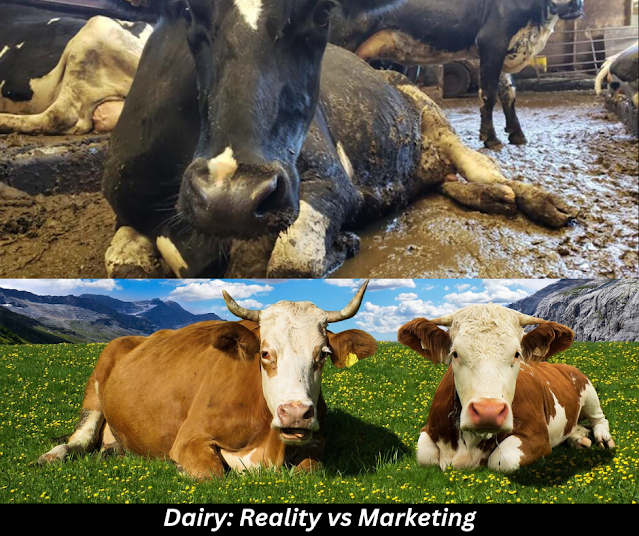"From lactose intolerance to animal welfare concerns, the negative health effects of dairy on humans and animals highlight the importance of making informed choices for their well-being, our well-being, and the well-being of the planet."
Dairy products have been a staple in many people's diets for centuries. They are often considered a source of essential nutrients like calcium and protein. However, in recent years, concerns have emerged regarding the negative health effects of consuming dairy products, not only for humans but also for the animals involved in the dairy industry.
In this article, we will explore the potential drawbacks of dairy consumption on human health and shed light on the impacts on animals.
Human Health Effects
Lactose Intolerance: Lactose, the sugar found in milk, requires the enzyme lactase to be properly digested. However, many individuals worldwide are lactose intolerant, lacking the necessary levels of lactase. This intolerance can lead to digestive issues such as bloating, diarrhea, and abdominal discomfort after consuming dairy products.
Allergies and Sensitivities: Dairy products, especially cow's milk, are a common allergen. Some individuals may experience allergic reactions, including skin rashes, hives, respiratory problems, or digestive disturbances. Even in the absence of allergies, many people are sensitive to the proteins found in dairy, such as casein or whey, which can cause inflammation and discomfort.
Hormonal Disruptions: Dairy cows are often treated with artificial hormones to increase milk production. These hormones can find their way into the milk consumed by humans, potentially disrupting the delicate hormonal balance in the body. Some studies have suggested a link between dairy consumption and an increased risk of certain hormone-related cancers, such as breast and prostate cancer.
Increased Risk of Chronic Diseases: Some research has indicated that excessive dairy consumption may contribute to the development of chronic diseases. High intake of saturated fats found in full-fat dairy products has been associated with an increased risk of cardiovascular diseases. Furthermore, certain dairy products, such as cheese and butter, can be high in cholesterol, leading to potential complications for individuals with elevated cholesterol levels.
Animal Welfare Concerns
Factory Farming: The dairy industry relies heavily on factory farming practices, where cows are often subjected to overcrowded and unsanitary conditions. These stressful environments can lead to the spread of diseases and increase the need for antibiotics and other medications. The welfare of dairy cows is compromised as they are often confined, suffer from painful conditions like mastitis, and have their natural lifespan significantly reduced.
Separation of Calves: In order to maximize milk production, dairy cows are separated from their calves shortly after birth. This practice can cause emotional distress for both the mother and the calf, disrupting their natural bonding process. Calves are often raised in separate environments, leading to a lack of natural nurturing and socialization.
Environmental Impact: The dairy industry has a significant environmental footprint. The production of dairy products requires large amounts of water, land, and feed for cows, contributing to deforestation, water pollution, and greenhouse gas emissions. Moreover, the disposal of dairy waste, such as manure, can contaminate water sources and harm local ecosystems.
Conclusion
While dairy products have long been considered a dietary staple, it is essential to be aware of the potential negative health effects they can have on both humans and animals. From lactose intolerance and allergies to hormonal disruptions and increased risks of chronic diseases, dairy consumption may not be suitable for everyone. Moreover, the dairy industry's factory farming practices and their impact on animal welfare and the environment raise ethical and sustainability concerns. As individuals, we have the power to make informed choices about our diets, considering alternatives and supporting practices that prioritize the well-being of both humans and animals.
References
Lactose Intolerance:
Allergies and Sensitivities:
Hormonal Disruptions and Increased Risk of Chronic Diseases:
Animal Welfare Concerns:
Environmental Impact:
- Dairy NutritionFacts.org

Comments
Post a Comment
We welcome your input!